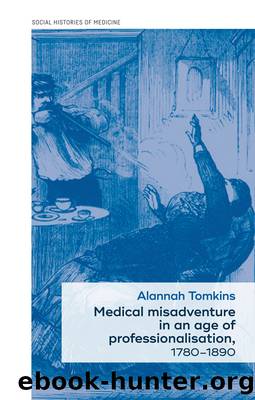Medical misadventure in an age of professionalisation, 1780â1890 by Alannah Tomkins

Author:Alannah Tomkins [Tomkins, Alannah]
Language: eng
Format: epub
Tags: Medical, History, Modern, 19th Century, Social History, General
ISBN: 9781526116109
Google: XHG5DwAAQBAJ
Publisher: Manchester University Press
Published: 2017-07-21T22:16:45+00:00
Conclusion
In cases of neglect under the poor law, structural conditions âallowed the perception of responsibility towards the pauper to be passed about between officials like the proverbial hot brickâ, but this was also permitted by emergent medical ethics that were driven by uncertainty and competition as much as disinterest.139 To some extent it was a weakness in the emergent professional persona that enabled aggression and finger-pointing on the part of the poor-law authorities. At the same time, the poor law offered practitioners the scope for charges of neglect against each other, which veiled self-interest in public spirit wherever treatment of a pauper, or a failure to serve the guardians adequately, could be cited. Misdemeanour under the poor law did not tend to offer the opportunity to levy manslaughter allegations, though, since these tended to cluster around deaths among obstetric patients and spanned a wider section of the social spectrum.
Neither charges of neglect nor manslaughter proved useful for schooling the incipient profession, whereas abortion charges were much more suitable for giving unequivocal signals to struggling doctors about the importance of professional (and by implication manly) probity. Nonetheless, the pressures of the medical market meant that these messages were not always heeded. A significant proportion of even the visible abortion trade was conducted by fully-qualified men, at least a proportion of whom were motivated by money. A desire to remain solvent won out against allegiance to professional strictures or sub-textual appeals to masculine disinterest.
Charges of neglect, manslaughter, and abortion collectively illustrate the risks and frustrations associated with rising expectations both inside and beyond the profession. These expectations are best detected in the frequency of quotes from practitioners driven to exasperation and then reported verbatim; the implication of such reporting practice is that readers were being invited to agree that all such expressions were inappropriate or reprehensible.
Even so, public reaction to practitioner prosecution ran the gamut from sentimental support for doctors to violent opposition. The reaction to Heap in Manchester is particularly telling, since it points to a deep disparity between patient and marketplace requirements, for reliable access to efficient abortion, and professional discourse, which severely deprecated the termination of pregnancy. It is perhaps ironic that this divergence seems less pronounced in the case of allegations of sexual assault and murder, covered in the next chapter. Professional and lay popular opinion seem to have been closer together, if not entirely coincident, in these latter types of felony.
Notes
â1â See also Chapters 4 and 6.
â2â I.A. Burney, Bodies of Evidence. Medicine and the Politics of the English Inquest 1830â1926 (Baltimore and London: Johns Hopkins University Press, 2000), pp. 4â6.
â3â Burney, Bodies of Evidence, p. 6.
â4â Burney, Bodies of Evidence, chapter 2; P. Fisher, âThe Politics of Sudden Death: The Office and Role of the Coroner in England and Wales, 1726â1888â unpublished PhD thesis (Leicester University, 2007), chapter 4. The Lancet's commitment to Wakley's campaign outlived him; Fisher, âSudden Deathâ, p. 98.
â5â Burney, Bodies of Evidence, p. 149.
â6â They could, however, turn to the press. See,
Download
This site does not store any files on its server. We only index and link to content provided by other sites. Please contact the content providers to delete copyright contents if any and email us, we'll remove relevant links or contents immediately.
| Africa | Americas |
| Arctic & Antarctica | Asia |
| Australia & Oceania | Europe |
| Middle East | Russia |
| United States | World |
| Ancient Civilizations | Military |
| Historical Study & Educational Resources |
Machine Learning at Scale with H2O by Gregory Keys | David Whiting(4292)
Never by Ken Follett(3937)
Fairy Tale by Stephen King(3370)
Oathbringer (The Stormlight Archive, Book 3) by Brandon Sanderson(3157)
The Man Who Died Twice by Richard Osman(3072)
Will by Will Smith(2910)
Rationality by Steven Pinker(2352)
Can't Hurt Me: Master Your Mind and Defy the Odds - Clean Edition by David Goggins(2323)
The Dark Hours by Michael Connelly(2300)
Friends, Lovers, and the Big Terrible Thing by Matthew Perry(2219)
The Dawn of Everything: A New History of Humanity by David Graeber & David Wengrow(2197)
Principles for Dealing With the Changing World Order: Why Nations Succeed and Fail by Ray Dalio(2039)
A Short History of War by Jeremy Black(1842)
HBR's 10 Must Reads 2022 by Harvard Business Review(1839)
Go Tell the Bees That I Am Gone by Diana Gabaldon(1754)
A Game of Thrones (The Illustrated Edition) by George R. R. Martin(1722)
Kingdom of Ash by Maas Sarah J(1668)
515945210 by Unknown(1660)
443319537 by Unknown(1545)
